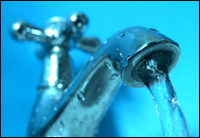Dear Umbra,
I live in New York City, which is reputed to have some of the best drinking water in the U.S. But I also happen to live in an old building that probably has lead pipes, so I buy Poland Spring water in five-gallon jugs each month. I’d prefer to drink tap water, but I don’t know how to find out whether my building’s water is polluted or not. How do I go about this? If it does have lead (etc.), what are the most affordable ways of treating it?
Ashley
New York, N.Y.
Dearest Ashley,
Go tap water! Hooray! The Natural Resources Defense Council has found that bottled water is not necessarily a safe drinking bet (check out the group’s report on the matter), so I support your desire to drink out of the spigot.

Public water systems in the U.S. are required to produce and distribute annual water-quality reports that honestly state test results for water-safety measurements mandated by the U.S. EPA. If you haven’t seen one in the mail, call your water utility, or you might be able to find it online on the EPA’s website. Also, by way of disclaimer, please note that government-mandated honesty may not preclude lying through omission or hedging (or, as this recent Washington Post article alleges, even more insidious deception); you may wish to double-check with your area water-safety watchdog organization.
You’re wise to be concerned about the pipes bringing water from the street to and through your home. Lead is highly malleable, has a low melting point, and is quite resistant to corrosion — attributes that explain why it has been used in water pipes for millennia. But drinking lead-infused water will make you dumb, sterile, wrinkly, and dead. Some folks think lead consumption may have hastened the fall of the Roman Empire.
Hence: You need to test your tap water for lead. Call your water system to find a reputable testing company. It may be that your supplier has free home testing services; wouldn’t that be lovely? If you rent your apartment, the supplier will also be able to inform you of the landlord’s obligation to conduct water testing, if there is one. Should you need to foot the bill yourself, tests for lead will run you somewhere between $25 and $100.
While you wait for your test results, follow these important guidelines: Run cold-water taps for about a minute, until the water is chilled and the sitting water has run through. Never drink water from hot-water pipes. I once had the pleasure of Sawzall-ing the pipes out of an old house. The hot-water pipes were filled with repulsive oozing black sludge. If the thought of drinking vile sediment pudding isn’t a sufficient deterrent, take note: If your pipes are lead, the goop is toxic. Bleagh.
Let’s say your lead results come back positive. It’s time to find yourself an effective filter. If the city’s water supplier can’t point you in the right direction, check out NSF International’s info on home water-treatement devices.
Thirstily,
Umbra

